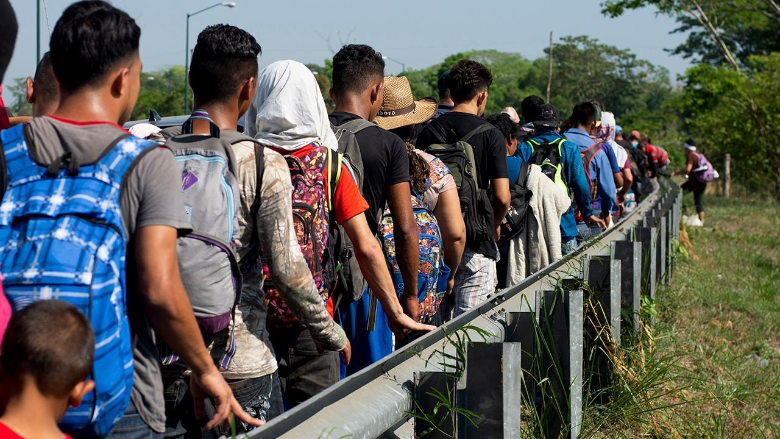Former President Donald Trump has announced a controversial new plan to combat illegal alien gangs in the U.S., promising to invoke the Alien Enemies Act of 1798 as part of a sweeping federal initiative named “Operation Aurora.”
During a rally in Colorado, Trump revealed the program’s details, vowing to target criminal networks like the notorious Venezuelan gang, Tren de Aragua. This announcement comes on the heels of multiple high-profile violent crimes allegedly committed by members of the gang, leading to increased concerns about illegal immigration and public safety.
Trump’s plan centers on using the Alien Enemies Act, a seldom-invoked part of the Alien and Sedition Acts passed during President John Adams’ administration in 1798. Historically, the law was used during wartime to allow the president to detain or deport non-citizens from enemy nations. Trump now aims to apply this 200-year-old statute to modern-day criminal activity, particularly focusing on suspected gang members, drug dealers, and cartel operatives who are undocumented immigrants. According to Trump, this would “end the scourge of illegal alien gang violence once and for all.”
In a statement during a September 2023 campaign stop, Trump outlined his intentions: “I’ll… invoke immediately the Alien Enemies Act to remove all known or suspected gang members… the drug dealers, the cartel members from the United States.”
The announcement of Operation Aurora came in response to a spate of violent crimes tied to illegal immigrant gangs, particularly the Tren de Aragua, a Venezuelan street gang that has been spreading across U.S. cities. One such incident occurred in Aurora, Colorado, where members of the gang were caught on camera breaking into an apartment, threatening the tenant, and later fatally shooting a 25-year-old man outside the building. These criminals, all of whom were in U.S. Border Patrol custody before being released into the country, are believed to be part of a larger network of gang-related activity.
The violence linked to Tren de Aragua is not isolated. Trump’s campaign also cited the murder of 12-year-old Jocelyn Nungaray, who was kidnapped, assaulted, and murdered by suspected gang members. Just this past week, police arrested over a dozen members of the gang who had taken over an apartment complex in San Antonio, Texas, terrorizing residents.
According to newly published data from Immigration and Customs Enforcement (ICE), there are currently over 13,000 illegal alien convicted murderers at large in the U.S. Trump’s campaign has heavily criticized Vice President Kamala Harris, whom he refers to as the “Border Czar,” for overseeing what he describes as the release of dangerous criminals into American communities.
The Alien Enemies Act of 1798, the central legal mechanism of Operation Aurora, is a wartime law designed to allow the president to deport or detain citizens of enemy nations without a trial. While initially intended for use during armed conflicts, Trump plans to repurpose this statute to target illegal immigrants involved in criminal activity. Critics of the plan argue that the Alien Enemies Act could lead to significant abuses of power, as it allows for action based solely on nationality or citizenship, bypassing due process.
Legal experts and advocacy groups have expressed concerns about the potential overreach of such a policy, citing the possibility of violating constitutional rights. The Brennan Center for Justice describes the Alien Enemies Act as “an overbroad authority that may violate constitutional rights in wartime and is subject to abuse in peacetime.” The law has historically been used against immigrants who were lawfully present in the U.S. but were targeted based solely on their national origin during times of conflict.
Not everyone agrees with Trump’s depiction of the gang crisis. Aurora’s mayor, Mike Coffman, publicly challenged Trump’s claims, asserting that the situation in Aurora has been exaggerated. In a statement posted on his Facebook page, Coffman emphasized, “Aurora is a considerably safe city — not a city overrun by Venezuelan gangs.” The mayor also invited Trump to visit Aurora and meet with local law enforcement to gain a clearer understanding of the reality on the ground. He added that while the incidents involving Tren de Aragua have occurred, they were confined to specific apartment complexes in a city of more than 400,000 residents.
Coffman criticized the former president for making claims about rising crime “without any evidence” and suggested that Trump’s portrayal of the city was alarmist. Despite these local reassurances, Trump’s campaign continues to focus on violent crimes attributed to illegal immigrant gangs, making immigration enforcement a central theme of his 2024 campaign.
Trump’s use of the Alien Enemies Act, if implemented, would mark an unprecedented application of the law in modern times. His tough-on-immigration stance has long been a cornerstone of his political platform, and Operation Aurora reflects a continuation of his efforts to prioritize border security and law enforcement. However, the proposal is likely to face significant legal challenges, particularly from civil rights organizations and immigration advocacy groups who argue that such actions would undermine the rule of law and due process.
As Trump’s 2024 campaign gains momentum, Operation Aurora is set to be one of the key policies shaping his appeal to voters concerned about immigration and crime. Whether the plan can withstand legal scrutiny or not, it represents yet another example of Trump’s willingness to push the boundaries of executive authority in pursuit of his policy goals.
